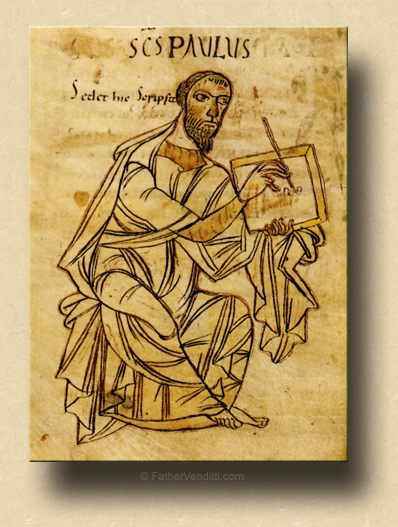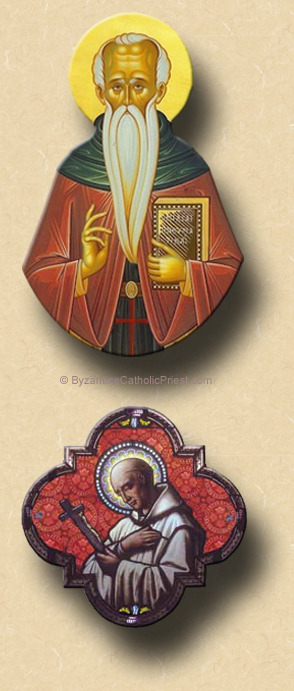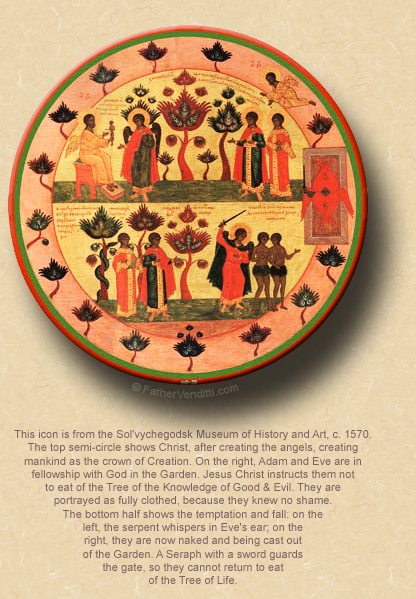Care for Some Cheese with Your Whine? Romans 13:11-14:4;
Matthew 6:14-21. The Fourth Sunday of the Triodion, called The Sunday of Cheesefare or The Sunday of Forgiveness. The Sunday before the Great Fast. The Holy Martyr Theodotus, Bishop of Cyrene.
Return to ByzantineCatholicPriest.com. |
11:41 AM 3/2/2014 —
Meanwhile, make no mistake about the age we live in; already it is high time for us to awake out of our sleep; our salvation is closer to us now than when we first learned to believe. The night is far on its course; day draws near. Let us abandon the ways of darkness, and put on the armour of light. Let us pass our time honourably, as by the light of day, not in revelling and drunkenness, not in lust and wantonness, not in quarrels and rivalries. Rather, arm yourselves with the Lord Jesus Christ; spend no more thought on nature and nature’s appetites.
 Find room among you for a man of over-delicate conscience, without arguing about his scruples. Another man can, in conscience, eat what he will; one who is scrupulous must be content with vegetable fare. Let not the first, over his meat, mock at him who does not eat it, or the second, while he abstains, pass judgment on him who eats it. God, after all, has found room for him. Who art thou, to pass judgment on the servant of another? Whether he keeps his feet or falls, concerns none but his master. And keep his feet he will; God is well able to give him a sure footing (Rom. 13:11-14:4). Find room among you for a man of over-delicate conscience, without arguing about his scruples. Another man can, in conscience, eat what he will; one who is scrupulous must be content with vegetable fare. Let not the first, over his meat, mock at him who does not eat it, or the second, while he abstains, pass judgment on him who eats it. God, after all, has found room for him. Who art thou, to pass judgment on the servant of another? Whether he keeps his feet or falls, concerns none but his master. And keep his feet he will; God is well able to give him a sure footing (Rom. 13:11-14:4).
And with that I just broke one of the cardinal rules of preaching by repeating to you the entire Apostolic reading, albeit in Msgr. Knox's far superior translation. One of the first things they teach you in homiletics class is don't waste time repeating a reading the people just heard. I did it because we're so used to the priest preaching about the Gospel that we tend to let our brains go to sleep during the singing of the Epistle; and, even though we've been focusing on the Apostolic readings since the beginning of Philips Fast, the New American Bible used in our Ruthenian Church's Epistle book is so poor, and Msgr. Knox's is so clear,—not to mentioned beautiful—it's a rule that I'm prepared to break.
I doubt that it was intentional, but this reading from the Blessed Apostle Paul's letter to the Christians in Rome is a compact compendium of almost everything we've been talking about over the past three months. The very first line, in which he exhorts the Romans to awake from sleep, harkens back to that mysterious line he quoted from in Ephesians in the reading from the First Sunday of Philips Fast, taken from what Msgr. Knox speculated was a baptismal hymn, cautioning them to “Awake, thou that sleepest, and arise from the dead, and Christ shall give thee light” (Eph. 5:14). Its meaning in the context of a baptismal celebration was obvious; but, he gave them another, more cabollistic interpretation, suggesting that their complacency toward the anti-Christian society around them represents them sleeping through their own extermination, unwilling to recognize the times in which they live.*
Then he tells the Romans to “abandon the ways of darkness, and put on the armour of light.” And how can we not remember his fiery rant to the Ephesians from the Second Sunday of Philips Fast, in which he whooped up the Ephesians to...
...wear all the weapons in God’s armoury, if you would find strength to resist the cunning of the devil.…Take up all God’s armour, then; so you will be able to stand your ground when the evil time comes, and be found still on your feet, when all the task is over…take up the shield of faith, with which you will be able to quench all the fire-tipped arrows of your wicked enemy; make the helmet of salvation your own, and the sword of the spirit, God’s word (Eph. 6:11,13,16,17).**
The next verses of Romans recall what we heard the Apostle tell the Colossians on the Third and fourth Sundays of Philips Fast, wherein he reminded them that their arguing among themselves only strengthened the attacks of the Devil against them,  and that the only way they could be assured of survival against him was to remain solidly in the Church, resisting the temptation of each to go his own way, and by supporting and encouraging those who fall into sin rather than condemning them.*** and that the only way they could be assured of survival against him was to remain solidly in the Church, resisting the temptation of each to go his own way, and by supporting and encouraging those who fall into sin rather than condemning them.***
The rest of this reading from Romans follows the same theme as last week's from First Corinthians about the true nature of fasting and how unwise it is to judge each other by the same set of standards, given that we're all at different places in our journey to God;† and this, of course, is why this passage is read on the Sunday of Cheesefare. Last week I gave you the bonus of two great Fathers of the Church, one from the East—Our Holy Father Dorotheos of Gaza—and one from the West—St. Bruno—who is not technically a Father of the Church since he lived in the Middle Ages, but I think just as wise; and, for the past ten years my Cheesefare Sunday homily has focused on him and his almost extreme interpretation of Christian charity, in which he exhorts the Carthusian monks, whenever they see a brother doing anything that is forbidden, to always assume he has permission, and thus protect themselves against the danger of judging another unjustly.
I don't pretend that you remember all of these homilies; but, the one for Cheesefare Sunday about St. Bruno you should know by heart, having heard it at least ten times during my twelve years here. There are, of course, both advantages and disadvantages to a priest being in a parish for such a long time, but one of the advantages is the ability to build upon what has been said; and, being the only priest in the parish gives one the ability to preach a series rather than disjointed and unconnected homilies. A few years ago we survived together a Philips Fast series on Confession, and before that we had a summer series on the Divine Liturgy. This year was as ambitious as it was unplanned: the original intention was to explore the Apostolic readings during Philips Fast, but we became so captivated by St. Paul that we continued with him straight through Christmas and into the Triodion;—I say “we” assuming you were as captivated as I was—and, if you missed any of that because of the weather, you can always go back on the web site and read those homilies. What will happen during the Great Fast itself I can't tell you. Perhaps we'll continue with St. Paul; who knows?
But as to Cheesefare Sunday: back when we were using St. Bruno for our springboard, we saw how his principle of doing the right thing to please God and not caring whether anyone else understands—or even if they misunderstand—is addressed very directly in that section of St. Paul’s Epistle to the Romans we just heard; but it is also presented to us in today’s Gospel in a veiled way—in a way that requires us to look deeply into the meaning of our Lord’s words. He says,
Again, when you fast, do not shew it by gloomy looks, as the hypocrites do. They make their faces unsightly, so that men can see they are fasting; believe me, they have their reward already. But do thou, at thy times of fasting, anoint thy head and wash thy face, so that thy fast may not be known to men, but to thy Father who dwells in secret; and then thy Father, who sees what is done in secret, will reward thee (Matthew 6:16,17).
What St. Bruno understood, and what we have to understand as well, is that by fasting our Lord is not simply speaking of abstaining from food for spiritual reasons; fasting here is interpreted as anything that we do that pleases God, even if it is not understood by anyone else. And when we realize that, all of a sudden we see that this has not to do simply with personal acts of mortification, like giving up food, but with everything that touches on our relationship with God and with one another. A person who consistently does what is right in his daily life will end up disappointing more people than he pleases, if he is truly doing what is right. Sometimes we make the mistake of thinking that what is pleasing to others is what is right; and that’s almost never the case. If it were, life would be a breeze; but we know it isn’t.
And that is, in fact, the reason that this Sunday, Cheesefare Sunday, is sometimes referred to as the Sunday of Forgiveness, for on this Sunday we are seeking forgiveness, not just from God, but also from one another. Because if we are true to the spirit of Lent, and make a serious effort to live the Gospel of Jesus Christ in those areas where we had not been before, we’re going to be disappointing someone somewhere, because we will be living to please God and not each other. So we begin Lent by recognizing that those around us will no longer be existing to make us happy; that not only should we now start to do what is pleasing to God, but that we should give the other people in our lives the freedom to do the same, and stop expecting everything they do to meet with our approval.
It is a twisted fact of human nature that the people who set the highest standards for themselves are the most miserable because no one around them lives up to their expectations. And it’s not simply a matter of excepting the failures of others—that’s too easy a rationalization—because it may not be a failure at all: the standards by which we think everyone should live may not apply to someone else because we don’t know the circumstances of that person’s life. Even if we were to completely eliminate personal sin from our lives, it would mean nothing if we still stood in judgment over someone else, or allowed someone else to be held accountable for making us happy.  It’s like our Lord says in the very first sentence of today’s Gospel: "Your heavenly Father will forgive you your transgressions, if you forgive your fellow men theirs; if you do not forgive them, your heavenly Father will not forgive your transgressions either" (Matt. 6:14,15). It’s like our Lord says in the very first sentence of today’s Gospel: "Your heavenly Father will forgive you your transgressions, if you forgive your fellow men theirs; if you do not forgive them, your heavenly Father will not forgive your transgressions either" (Matt. 6:14,15).
Now, that raises a question: does this not put us on the track of becoming moral relativists? After all, right and wrong are determined by God, not by us; so, how do we “forgive” (to use our Lord’s own word) someone who’s life or actions departs from the Gospel of Jesus Christ? And here’s where the other Liturgical texts for this day are instructive. They focus us to contemplate God’s supreme act of judgment upon man: the expulsion of Adam and Eve from the Garden of Eden. The sin of Adam was the sin of wanting to be God, repeated in each one of us every time we set aside God’s law and decide for ourselves what’s right and wrong. That’s why it’s called the “Original Sin,” because all sin stems from it. And man paid a penalty, as the Book of Genesis tells us: our food and livelihood are no longer supplied by God, but by the sweat of our brow; the nakedness of our bodies ceases to be a thing of beauty and becomes a source of temptation; even the pain of a woman in childbirth, Genesis tells us, is the result of that one first sin. So terrible is that sin—usurping the authority of God and deciding for ourselves the difference between right and wrong—that its effects are passed on through every generation (cf. Gen. 3:14-19).
And, yet, in spite of this, God still judged man worth saving: he loved his creation so much that, instead of allowing man to suffer the price for that sin, he became a man himself and suffered it for us. That’s why on the Sunday’s of the Great Fast we celebrate the Liturgy of St. Basil. We whine about it every year and tell each other it’s much too long; but its anaphora recounts the history of our salvation, from the fall of Adam to the Passion of Our Lord, reminding us that God, instead of simply forgiving us—which would have obfuscated the very concept of his justice—chose instead to become one of us and pay the penalty of death himself. If God has chosen to do that, then how can we continue to harbor ill thoughts against another whose wrong against us is so petty in comparison?
This has certainly been the longest homily I've preached so far this year, so you can observe the Sunday of Forgiveness by forgiving your pastor for that. So, I'll bring it to an abrupt end with one more visit from our friend, Abba Dorotheos, who asks us,
Why do we usurp God's right to judge?...It is for God alone to judge, to justify or to condemn. He knows the state of each one of us and our capacities, our deviations and our gifts, our constitutions, and our preparedness...according to the knowledge that He alone has....And how do you know what tears [your brother] shed about it before God? You may well know about the sin, but you do not know about the repentance.††

* Cf. 8:35 PM 11/18/2013 The Twenty-Sixth Sunday after Pentecost. Wake Up and Smell the Coffee.
** Cf. 3:05 AM 11/25/2013 The Twenty-Seventh Sunday after Pentecost. Wake Up and Smell the Coffee, Part Two: No Decaf Allowed.
*** Cf. 12:24 PM 12/1/2013 The Twenty-Eighth Sunday after Pentecost. Wake Up and Smell the Coffee, Part Three: the World, the Flesh and Vatican II; and, 11:42 AM 12/8/2013 The Twenty-Ninth Sunday after Pentecost; the Maternity of St. Ann. Wake Up and Smell the Coffee, Part Four: We're All In This Together (an Epilogue to the Phillips Fast Epistles).
† Cf. 11:57 AM 2/23/2014 The Third Sunday of the Triodion, called The Sunday of Meatfare. One Man's Meat is Another Man's Poison.
†† Dorotheos of Gaza, Discourse on Refusal to Judge our Neighbor.
|

